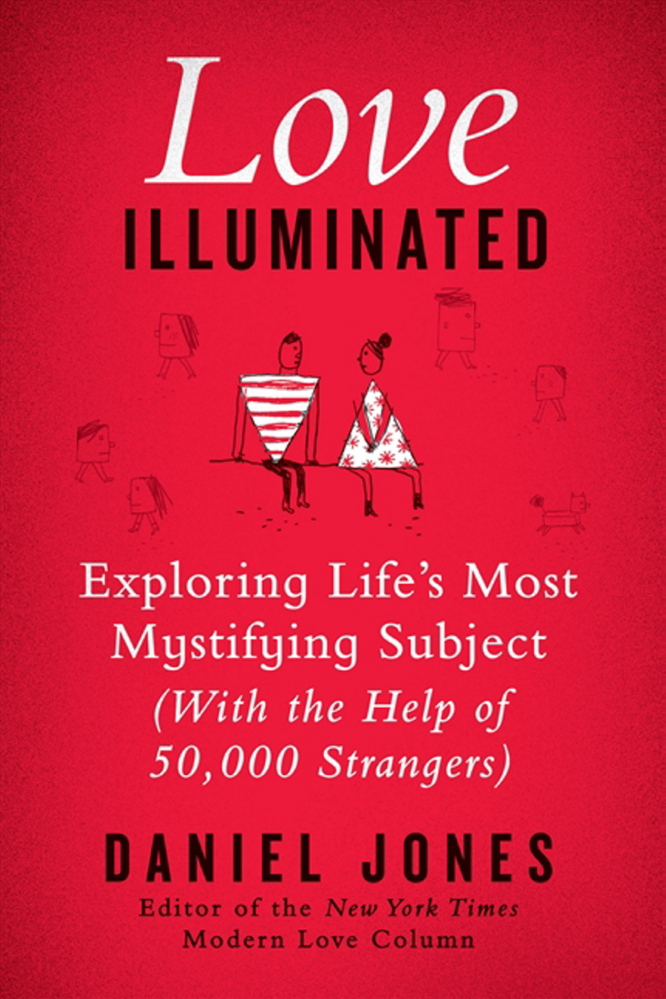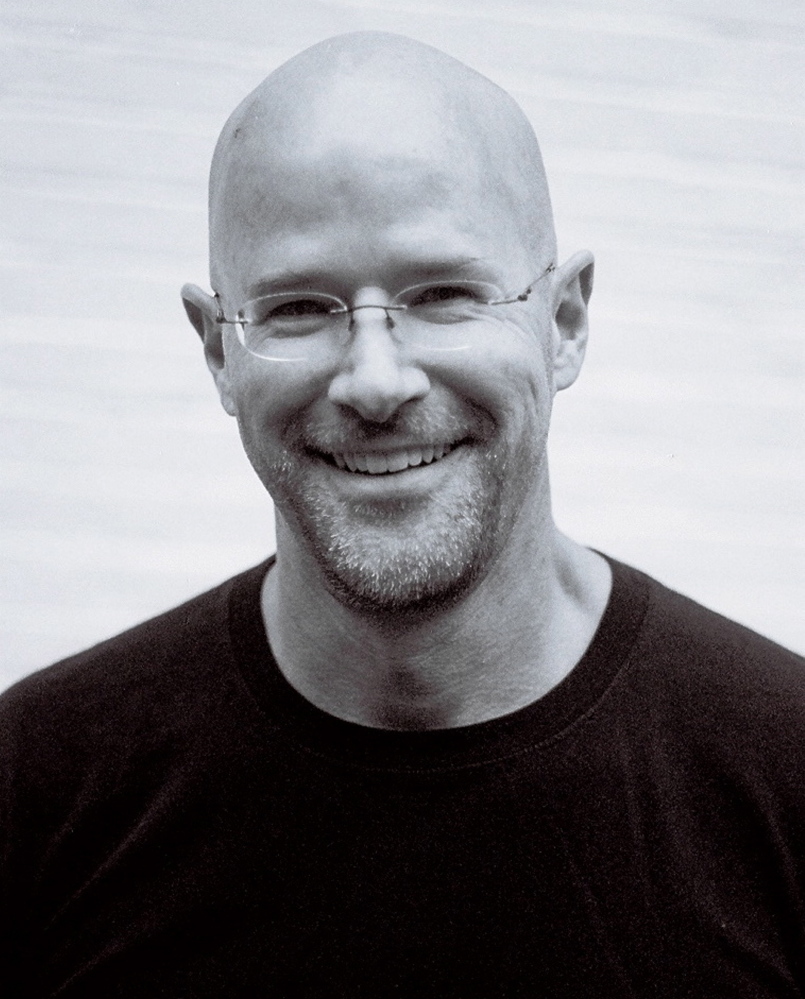Editor Dan Jones has always had a clear sense of how popular Modern Love is with American writers. In the nearly 10 years the New York Times Sunday column he edits has been published, it has been a springboard for book deals (40 at last count). It’s the first and one of the best publicity stops for anyone peddling a book involving relationships. He gets an average of 500 submissions, unsolicited, every month and reads them all.
But now that he’s written a long take on love himself, called “Love Illuminated: Exploring Life’s Most Mystifying Subject (With the Help of 50,000 strangers),” and has hit the road for the obligatory tour, he’s come to understand what a fierce hold the column has on readers all across America, too.
In Washington, D.C., 600 people bought $12 tickets just to hear him talk. They’ve packed venues from San Francisco to Minneapolis. And now in Maine, the Telling Room is expecting a big crowd at a fundraiser for the nonprofit writing center Thursday at Space Gallery.
We called Jones up to talk about the book, being woefully behind at his day job and the pitfalls and plus sides of looking for love in places as small and – let’s just use the word – incestuous, as Maine.
Q: How was this book conceived? Did you envision it as the back story behind editing the love stories of hundreds of strangers?
A: I’d been writing, over the years, an editor’s column on Valentine’s Day where I’d make observations and talk about trends, but just in 1,800 words. My agent was encouraging me to do that in a longer form. I can’t say that set me off to the races, but it was a start. I went back through the hundreds of essays I’d published and looked at what they started to say in aggregate, and particularly all these essays from the annual college essay contest we run, and really looking at how technology was affecting their lives and relationships. It took pulling my head out of the editorial weeds to look at the big picture.
Q: What surprised me about the book was that it was helpful. Not self-help but somewhere in that zone. I expected more of a tell-all about working with lovelorn American neurotics.
A: It’s funny you would say that because I was, very much from the beginning, uncomfortable in the sort of advisor role. I didn’t feel like I wanted to write an advice book or tell people what to do. But as I started to make sense of things, at least in certain parts of it, there were definite strains of behavior that you can see in the way people are acting or in how they are pursuing relationships, and you can see how often that ends in disappointment. I do feel like people learn more from hearing about the patterns of other people’s stories than from a set of rules. But in the end I was still a little shy about saying do this or don’t do that, unless I was doing it in a playful way.
Q: But do you have any advice for people dating in a place as small as Maine, where it can feel like everyone knows everyone or will eventually? If you don’t treat partners well, word spreads, although that doesn’t mean you’ll be called on it directly. Someone told me, “It’s Maine, so we all play nice.”
A: It almost sounds old-fashioned, in a reassuring kind of way. And that is moving in the opposite direction from most places, where the real challenge people face is the lack of knowledge about anyone’s track record. They’re dating total strangers one after another. I am sure it gets claustrophobic, but I see more nervousness and disappointment about the other extreme.
There is a lot of anxiety around the randomness of meeting people when there are so many people at your disposal. Ideas about fate and destiny have become so important to people. I think in a place like Portland, maybe there is the stress of running into people you’ve dated, or knowing things about them, but maybe the upside is that you don’t have to deal as much with the anxiety of randomness and that huge volume of people. It seems like people are so much more successful when they have less choices then when they have more.
Q: Although it is disconcerting when you see someone you think you’re still involved with is on Match.com. That’s happened to multiple Mainers I know.
A: What’s funny is that my wife (novelist and editor Cathi Hanauer) and I signed up for online dating in the Northampton area, just because I wanted the experience (for the book). Not the dates themselves, but the process, the idea that you are going out with people that can’t be vouched for in anyway. And then I recognized people from my own town who were swingers and they were looking for other people to swing with. It’s strange how this is a forum that is supposed to be anonymous in a way, and they wouldn’t have gone around and put up a flyer saying they were swingers, but this is the equivalent of that if you are in a small town. These were people that I recognized, but didn’t know well. I didn’t know that about them and now I do.
Q: You’re unusual in that you live and edit from Western Massachusetts and didn’t come up through the New York Times reporting and editing ranks. How did you end up with this job?
A: Trip Gabriel (then Times Styles editor) had this idea bounding around his head. Do you remember those Hers and About Men columns that used to run in the Times? He had liked that long-form personal essay that was specifically about relationships. My wife had done the anthology “Bitch in the House” and then I did “The Bastard on the Couch.” We had been getting a lot of coverage and he read both of our books and then sent a reporter up to do a story on us for Styles. Not long after that he called us and proposed this idea that we do it together, as a couple. Cathi backed out after two essays; it was really a one person job and she didn’t like the exposure of having people pursuing her. But I liked it from the start. When the column started, I was concerned about job security. I asked him how long these things usually last and he said, “I don’t know, one to three years maybe?” I never thought it would last, but it’s coming up on 10 years this summer.
Q: What happened to that television series someone was making about your life and job?
A: It started at HBO and then it went to Lifetime. Lifetime is the one that actually made the pilot and saw it through. I think it cost a lot of money. People pour so much work and money and emotional investment into these things and at any time the plug can be pulled. They showed the pilot to focus groups and sample audiences, and they weren’t enthusiastic about it.
Q: Were you?
A: I thought the script was good and the show was aiming to be smart and the acting was really good. They had all these good cast members (Eric Stoltz played Jones, Cara Buono was the style editor, Ally Sheedy was the assistant managing editor) and I thought it had so much promise. The wait (for the network to make the decision to proceed or not) was just agonizing. Two months passed and I knew it wasn’t going to happen. I did get a DVD of the show. And I had said, “All I want is one show.”
Q: “Love Illuminated” came out in February so you’ve been on the road a lot. What is different about this book tour from touring with your novel, “After Lucy,” or the anthology?
A: It was really fun and satisfying because I just don’t get out that much. And I am used to the book tour where you are just peddling your book and you are going to places where you have friends and family and are hoping four people show up. But followers of the column, people who want to be in the column, they were coming out in the hundreds in so many places. It was interesting to see how much people use the column in different ways, how much they share it – where, say, a mother and daughter will talk about it every week. In Minneapolis, there was a woman there who works with hospice and told me they use it all the time for people who are trying to mend relationships with people before they die.
Q: How did you juggle your day job?
A: Every day I was on the road was a day that I got farther behind at work. I got as far ahead as I could, which was a couple of months, but then I stopped reading submissions for about six weeks. What I hadn’t counted on was that all of this media exposure generated more submissions while I was gone – double what I usually get.
Q: Yikes, do you have help reading them?
A: No one helps. But I don’t read through all of them. I read farther into more of them than I have time for because people who submit pretty much know what they are doing. Ninety-five percent of the people who submit read the column regularly, or have written it specifically for the column. It’s just a matter of whether they succeed or not. It’s really a relief when I get that material that’s (obviously wrong), say, a poem. I think, ‘Thank God, one less to read.’
Q: I’ve heard you don’t like to get submissions via agents, is that true?
A: I’m not sure it’s worth an agent’s while. What is interesting to me is that the readers prefer no-name writers to named writers. They value this idea that people writing in are just normal people from around the country. People have this idea that writers aren’t normal people. And I also find that people who are younger writers, not in terms of age but in terms of how long they have been working at their writing, often have a more interesting story than someone who has been at a while. I have discovered that most essays I publish represent the most important story in the person’s life. Often that is a story that a newer writer is going to have and be eager to share. That’s what readers want. They really want those goods. That one powerful story.
Send questions/comments to the editors.




